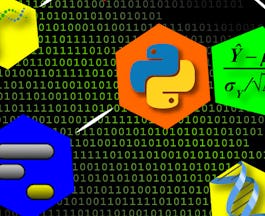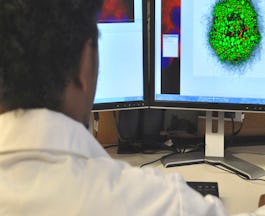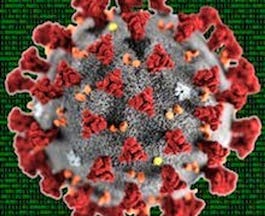Filter by
The language used throughout the course, in both instruction and assessments.
Choose the Computational Biology Course That Aligns Best With Your Educational Goals

University of California San Diego
Skills you'll gain: Bioinformatics, Algorithms, Computer Programming, Probability & Statistics, Computational Thinking, Computational Logic, Python Programming, Theoretical Computer Science, Critical Thinking, Graph Theory, General Statistics, Statistical Programming

Johns Hopkins University
Skills you'll gain: Bioinformatics, Computer Programming, Data Analysis, Python Programming, Computational Thinking, General Statistics, Exploratory Data Analysis, R Programming, Algorithms, Computer Programming Tools, Data Analysis Software, Biostatistics, Statistical Analysis, Programming Principles, Probability & Statistics, Statistical Tests, Data Structures, Operating Systems, Research and Design, Big Data, Computational Logic, Problem Solving, Statistical Programming, Experiment, Correlation And Dependence

Icahn School of Medicine at Mount Sinai
Skills you'll gain: Bioinformatics, Probability & Statistics, Mathematics, Differential Equations, Network Analysis, Graph Theory, Matlab
 Status: Free
Status: FreeUniversity of Washington
Skills you'll gain: Mathematics, Computer Programming, Mathematical Theory & Analysis, Probability & Statistics, Python Programming, Computational Logic, Data Analysis, Artificial Neural Networks, Computational Thinking, Linear Algebra, Human Learning
 Status: Free
Status: FreeUniversity of California San Diego
Skills you'll gain: Bioinformatics, Computational Thinking, Problem Solving, Biostatistics, Computational Logic, Critical Thinking

University of California San Diego
Skills you'll gain: Bioinformatics
 Status: Free
Status: FreeDuke University
 Status: Free
Status: FreeUniversity of Arizona

University of California, Davis
Skills you'll gain: Big Data, Computational Thinking, Data Analysis, Machine Learning, Human Learning, Network Analysis, Machine Learning Algorithms, Social Media, Critical Thinking, Data Management, Natural Language Processing, Algorithms, Exploratory Data Analysis, Network Architecture, Network Model, Probability & Statistics, Theoretical Computer Science, Applied Machine Learning, Computer Networking, Data Model, Machine Learning Software, Statistical Machine Learning, General Statistics, Graph Theory

Stanford University
Skills you'll gain: Algorithms, Theoretical Computer Science, Computer Programming, Problem Solving, Graph Theory, Mathematics, Data Structures, Computational Thinking, Mathematical Theory & Analysis, Critical Thinking, Computational Logic, Programming Principles, Software Engineering

Icahn School of Medicine at Mount Sinai
Skills you'll gain: Matlab
 Status: Free
Status: FreeThe University of Edinburgh
Skills you'll gain: Computer Programming, Data Analysis, Python Programming, Applied Machine Learning, Clinical Data Management, Machine Learning, Data Analysis Software, Data Management, Human Learning, Probability & Statistics, Natural Language Processing
In summary, here are 10 of our most popular computational biology courses
- Bioinformatics: University of California San Diego
- Genomic Data Science: Johns Hopkins University
- Systems Biology and Biotechnology: Icahn School of Medicine at Mount Sinai
- Computational Neuroscience: University of Washington
- Biology Meets Programming: Bioinformatics for Beginners: University of California San Diego
- Applied Bioinformatics: University of California San Diego
- Introduction to Genetics and Evolution: Duke University
- Astrobiology: Exploring Other Worlds: University of Arizona
- Computational Social Science: University of California, Davis
- Algorithms: Stanford University










